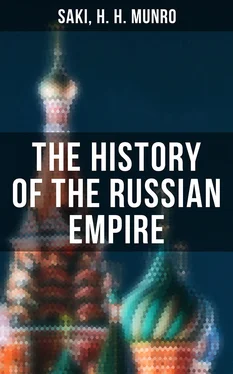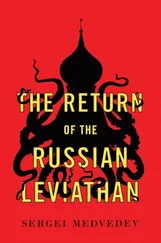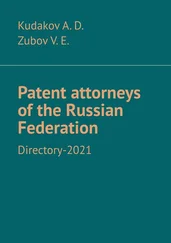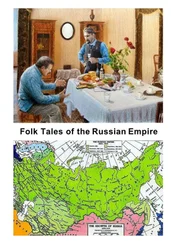Array Saki - The History of the Russian Empire
Здесь есть возможность читать онлайн «Array Saki - The History of the Russian Empire» — ознакомительный отрывок электронной книги совершенно бесплатно, а после прочтения отрывка купить полную версию. В некоторых случаях можно слушать аудио, скачать через торрент в формате fb2 и присутствует краткое содержание. Жанр: unrecognised, на английском языке. Описание произведения, (предисловие) а так же отзывы посетителей доступны на портале библиотеки ЛибКат.
- Название:The History of the Russian Empire
- Автор:
- Жанр:
- Год:неизвестен
- ISBN:нет данных
- Рейтинг книги:3 / 5. Голосов: 1
-
Избранное:Добавить в избранное
- Отзывы:
-
Ваша оценка:
- 60
- 1
- 2
- 3
- 4
- 5
The History of the Russian Empire: краткое содержание, описание и аннотация
Предлагаем к чтению аннотацию, описание, краткое содержание или предисловие (зависит от того, что написал сам автор книги «The History of the Russian Empire»). Если вы не нашли необходимую информацию о книге — напишите в комментариях, мы постараемся отыскать её.
The Rise of the Russian Empire is a historical study on Russian history, written by Hector H. Munro. The Book covers the period from the 9th century and the dawn of Russian empire, to 17th century and the rise of the Romanov dynasty.
The History of the Russian Empire — читать онлайн ознакомительный отрывок
Ниже представлен текст книги, разбитый по страницам. Система сохранения места последней прочитанной страницы, позволяет с удобством читать онлайн бесплатно книгу «The History of the Russian Empire», без необходимости каждый раз заново искать на чём Вы остановились. Поставьте закладку, и сможете в любой момент перейти на страницу, на которой закончили чтение.
Интервал:
Закладка:
Igor did not long enjoy the fruits of this success. Baulked of their expected campaign, his men of war chafed at the inaction of the old man’s court, and envied the comparative advantages thrown in the way of Svenald’s body-guards. It was a custom of the Russian rulers to spend one-half of the year, from November till April, in visiting the scattered districts of their dominion, for the double purpose of keeping in touch with their widely-sundered subjects and gathering in the revenue. This winter harvesting of the tribute (which Igor in his declining years left in the hands of his deputed steward) is interesting as being probably the earliest stage of Russian home trade. For the most part the payment in kind consisted of furs and skins, the bulk of which went from the various places of collection in boat-loads down to Kiev, from thence eventually making its way to the sea marts of Southern Europe. The forest country of the Drevlians, rich in its yield of thick-coated sables and yellow-chested martens, lay in convenient neighbourhood to Kiev, and thither the Prince’s men clamoured to be led for the purpose of gleaning an increased tribute. In a moment of fatal weakness Igor consented, and in the autumn of 945 set out to close his reign as he had begun it, in a quarrel with “the tree people” over the matter of their taxing. The armed host which accompanied the Prince overawed the resentment bred by this stretching of the sovereign claims, but the apparent ease with which the imposts were gathered in tempted Igor to linger behind his returning main-guard for the purpose of exacting a further levy. The exasperated Drevlians, hearkening to the counsel of their chieftain, Mal, “to rise and slay the wolf who was bent on devouring their whole flock,” turned suddenly upon the fate-blind Igor in the midst of his importunings and put him to a hideous death. Two young trees were bent towards each other nearly to the ground, and to them the unfortunate tyrant was bound; then the trees were allowed to spring back to their normal position. Thus did the tree people avenge their wrongs.
The safest standard by which to judge a reign of the inward history of which so little can be known is the measure of stability which it leaves behind it. The widow of the murdered Prince and his young heir Sviatoslav came peaceably into the vacant throneship, and it is no small tribute to the statecraft of Rurik and his successors that the grandson of the Varangian stranger and adventurer should inherit, at a tender age and under the guardianship of a woman, the Russian principality without opposition and without question.
The young Kniaz, 12notwithstanding the Slavonic name which he was the first of his house to bear, was brought up mainly among Skandinavian influences, his person and the domestic management of the State being entrusted to Varangian hands. His mother Olga bore no small share of the administration, and the vigour and energy of her doings were well worthy of the heroic age of early Russia. The first undertaking which was called for, alike by political necessity and the promptings of revenge, was the chastisement of her husband’s murderers. With the idea possibly of averting the storm by a bold stroke of diplomacy, the latter had sent messengers to the widowed princess suggesting a connubial alliance with the implicated chieftain Mal, a proposal which was met with a feigned acceptance. Having lulled the apprehensions of the Drevlians, Olga marched into their country with a large following and turned the projected festivities into a massacre, after which she besieged the town of Korosten, 13the scene of Igor’s death, and the last refuge of the disconcerted rebels. The Chronicle of the monk of Kiev gives a quaint, old-world account of the manner of the taking of Korosten. All the summer the inhabitants defended themselves stubbornly, and the princess at last agreed to conclude a peace on receipt of a tribute, which was to consist of a live pigeon and three live sparrows from each homestead. How they caught the sparrows is left to the imagination, but the tribute was gladly paid. At the approach of evening Olga caused the birds to be set free, each with a lighted brand fastened to its tail, whereupon their homing instincts took them back to their dwellings in the thatched roofs and barns of Korosten, with the result that the town was soon in a blaze, and the inhabitants fell easy victims to the swords of the besiegers. Thus was avenged the death of Igor, the son of Rurik.
Shortly after this exploit Olga left Kiev and went into the northern parts of her son’s realm, fixing her court for some years at Novgorod and Pskov, and raising the prosperity of those townships by keeping up a connection with the Skandinavian lands. Later she turned her thoughts towards the south, not with warlike projects, as her forerunners had done, but with peaceful intent. Accompanied by a suitable train she journeyed, in the year 957, to Constantinople, where she was received and entertained with due splendour by the Emperor Constantine-born-in-the-Purple and the Patriarch Theophylact. Here, in the metropolis of the Christian religion, surrounded by all the splendours of ritual of which the Greeks were masters, this surprising woman adopted the prevalent faith, received at the hands of her Imperial host and sponsor the baptismal name of Helen, and became “the first Russian who mounted to the heavenly kingdom”—a rather disparaging reflection on the labours of the early Church at Kiev.
Loaded with presents from the Imperial treasury, Olga returned to her son, whom she strove fruitlessly to detach from the gods of his fathers to the worship of the new deities she had brought from Constantinople. The Russian mind was not yet ripe for the mystic cult of the Greek or Latin Church, and the conversion of the Prince’s mother made little impression on either boyarins or people. In the year 964 Sviatoslav definitely assumed the government of the country, and struck the key-note of his reign by extending his sway over the Viatitches, the last Slavonic tribe who paid tribute to the Khazars. This was only preliminary to an attack on that people in their own country. The fate of their once powerful empire was decided in one battle; the arms of the young Kniaz were victorious; Sarkel, the White City, fell into his hands, the outlying possessions of the Khazars, east and south, were subdued, and the kakhanate was reduced to a shadow of its former glory. It would have been a wiser policy to have left untouched, for the time being, the integrity of a State which was no longer formidable, and which interposed a civilised barrier between the Russian lands and the barbarian hordes of the East, and to have pursued instead a war of extermination against the Petchenigs. Sviatoslav was himself to experience the disastrous results of this mistake.
968
In the following year the centre of interest shifts from the south-east to the south-west. The Greek Emperor, Nicephorus Phocas, irritated against his vassal Peter, King or Tzar of Bulgaria, in that he had not exerted himself against the Magyars, who were raiding the Imperial dominions, turned for help, according to the approved Byzantine policy, to another neighbour, and commissioned Sviatoslav to march against Bulgaria. A large sum of Greek gold was conveyed to Kiev by an ambassador from the Emperor, and in return the Russian Prince set out for the Danube with a following of 60,000 men. The onset of the invaders was irresistible, and the Bulgarians scattered and fled, leaving their capital, Péréyaslavetz, and Dristr, a strongly fortified place on the Danube, in the hands of the conqueror. To complete the good fortune of Sviatoslav the Tzar Peter died at this critical moment, and the Russian Prince settled down in his newly-acquired city, undisputed master of Bulgaria. East and west his arms had been successful, but in the very heart of his realm he had left a dread and watchful enemy, who would not fail to take advantage of his absence. While his army was at quarters in the head city of the Bulgarians, his own capital was being besieged and closely pressed by the Petchenigs, that “greedy people, devouring the bodies of men, corrupt and impure, bloody and cruel beasts,” as the monk of Edessa portrays them; in which certificate it is to be hoped they were over-described. The folk in the beleaguered city, among the rest the aged Olga and the young sons of Sviatoslav, were in straits from want of food, and must have succumbed if one of their number had not made his way by means of a feint through the enemy’s camp, and carried news of their desperate condition to a boyarin named Prititch who was luckily at hand with a small force. On his approach the Petchenigs drew off, thinking that the Prince himself had returned with his army, and Kiev was relieved from the straits of famine. Sviatoslav meanwhile had learned of the danger which threatened his realm and household and hastened back from Bulgaria. Even this narrowly staved-off disaster did not open his eyes to the menace which these undesirable neighbours ever held over him and his, and he contented himself with inflicting a severe defeat on them and concluding a worthless peace. Possibly he found it hard to arouse among his followers any enthusiasm for a campaign against an enemy who had no wealthy cities to plunder or riches of any kind available for spoil. In any case he was bitten with the desire, to which rulers of Russia seem to have been periodically subject, of shifting the seat of his government to a fresh capital. Before his mother and his boyarins he declared his project of fixing his seat at Péréyaslavetz in preference to Kiev, and enumerated the advantages of the former. From the Greeks came gold, fabrics, wine, and fruits; from Bohemia and Hungary horses and silver; from Russia furs, wax, honey, and slaves. To Olga, with the hand of death already on her, the question was not one of great moment, and four days later she had made her last journey to a vault in the cathedral of Kiev. A certain compassion is excited by the contemplation of the aged queen, dying lonely in a faith that her husband had never known, which her son had not accepted, just as the realm over which she had ruled so actively was to be enlarged and its political centre shifted. Her death removed the last obstacle to Sviatoslav’s design, the last that is to say with which he reckoned. Before departing for Bulgaria the Prince set his sons, who could not at this date (970) have been of a very mature age, in responsible positions, Yaropalk, the elder, becoming governor of Kiev, and Oleg prince of the Drevlians. The Novgorodskie, who had been left for many years to the hireling care of Sviatoslav’s deputies, demanded a son of the princely house as ruler, threatening in case of refusal to choose one from elsewhere for themselves; here the stormy spirit of Velikie Novgorod shows itself for the first time. Happily the supply of sons was equal to the demand; by one of Olga’s maidens named Malousha the Prince had become father of Vladimir, destined to play an important part in the history of Russia, and to him, under the guardianship of his mother’s brother Drobuinya, was confided the government of the northern town. Having thus arranged for the present security and future confusion of his territories by instituting the system of separate appanages, Sviatoslav set out for his new possession beyond the Danube. “A prince should, if possible, live in the country he has conquered,” wrote the political codist of mediæval Italy, and the Russian monarch found that even his brief absence had lost him much of the fruits of his victory. The Bulgarians mustered to oppose his march with a large force, and a desperate battle ensued, in which defeat was only staved off from the invaders by the heroic exertions of their leader. Péréyaslavetz was retaken, and Sviatoslav again became master of the Balkan land, permitting, however, Boris, son of the late Tzar, to keep the gold crown, frontlet, and red buskins which were the Bulgarian marks of royalty. The Greeks now repented their folly in having established in their immediate neighbourhood, within a few short marches of Constantinople, a prince who was far more dangerous to them than ever the Bulgarian Tzars had been. John Zimisces, who had succeeded the ill-fated Nicephorus on the precarious throne of the Eastern Empire, called upon Sviatoslav to fulfil the engagement made with his predecessor and evacuate the Imperial dependency. The Prince in possession contemptuously refused to comply with this demand, and threatened instead to march against Constantinople and drive the Greeks into Asia. Fortunately for the Empire at this crisis her new ruler was a soldier of proved ability, and knew also who were the right men to rely on for active support and co-operation. On the other hand Sviatoslav prepared for the coming struggle by enlisting the aid of the Bulgarians themselves, the Magyars, and even roving bodies of Petchenigs. With this mixed force he burst into Thrace, ravaging the country up to the walls of Adrianople, where the Imperial general Bardas-Scleras, brother-in-law of Zimisces, had entrenched himself. Here in the autumn of 970 the fierce bravery of the Russians and their allies was matched against the Greek generalship, with the result that Sviatoslav was forced to retire into Bulgaria. The recall of Bardas to suppress an insurrection in Capadocia prevented him from following up his advantage, and gave the Russians an opportunity for retiring from a position which was no longer safe. Sviatoslav, however, either did not see his danger, or chose to disregard it rather than return home baffled and empty-handed. Accordingly he spent the year 971 in aimless raids into Macedonia, while his wily enemy made the most elaborate preparations for his destruction. In the spring of 972 Zimisces advanced with a large army into Bulgaria, while a Greek fleet blocked the mouths of the Danube, cutting off the Russian line of retreat. Sviatoslav with the bulk of his army was encamped at Dristr, and here tidings came that the Emperor had crossed the Balkans and, after a stubborn resistance, taken Péréyaslavetz—“the Town of Victory”—and possessed himself of the person of Prince Boris. Nothing daunted, Sviatoslav led his army against that of Zimisces, and a battle ensued which, from the heroic valour with which it was contested and the important issues involved, deserves to be recognised as one of the decisive battles of history. Both leaders showed the utmost personal courage, and victory for a long while hung doubtful, but at length the Greek forces prevailed and Sviatoslav was driven back upon Dristr, his last stronghold in Bulgaria. This time the Imperial success was followed up, and the town was attacked with a vigour and determination which was only equalled by the stubbornness of the defence. The Russians made sorties by day, retreating when outnumbered, under the protection of their huge bucklers, to within the walls of the town, from whence they issued at night, to burn by the light of the moon the bodies of their fallen comrades, and sacrifice over their ashes the prisoners they had taken. By way of propitiating their gods, or possibly the Danube, which was covered with the boats of their enemies, they drowned in its waters cocks and little children. 14The Magister John, a relation of the Emperor, having fallen into their hands in a skirmish, was torn in pieces and his head exposed on the battlements. The besieged, however, were daily reduced in numbers and weakened by want, and Sviatoslav resolved on a last bid for victory. Swarming forth from behind their battered ramparts, the men of the North met their foes in open field, and the wager of battle was staunchly and obstinately contested. Sviatoslav was struck off his horse and nearly killed, but the Russians did not give way until mid-day, when a dust-storm blew into their faces and forced them to yield the fight, leaving outside the walls of Dristr, according to the Byzantine annalists, 15,000 slain. The monkish chroniclers, as usual, attributed the hard-won victory to supernatural intervention, and while the Imperial soldiers were resting from their exertions a story was circulated throughout the camp giving the credit of the day to an apparition of S. Theodore of Stratilat, who had appeared in the thick of the battle mounted on a white horse. The Russian defeat, whether due to saint, army, or dust-storm, was sufficiently decisive to bring the Prince to sue for terms, which were readily granted by the Emperor. The Russians engaged to withdraw from Bulgaria and to live at peace with the Eastern Empire; the Greeks on their part engaged to permit Russian merchants free commercial intercourse at Constantinople. More than this, the Emperor requested the Petchenigs to allow Sviatoslav and his thinned host unmolested passage to his own territories. Whether this was done in good faith, or whether secret instructions were given to the contrary, is a matter of opinion, or at most of induction; it is pleasanter to set against the general treachery of Byzantine statecraft the fact that Zimisces was a brave man, and to give him credit for the honour which is the usual accompaniment of courage.
Читать дальшеИнтервал:
Закладка:
Похожие книги на «The History of the Russian Empire»
Представляем Вашему вниманию похожие книги на «The History of the Russian Empire» списком для выбора. Мы отобрали схожую по названию и смыслу литературу в надежде предоставить читателям больше вариантов отыскать новые, интересные, ещё непрочитанные произведения.
Обсуждение, отзывы о книге «The History of the Russian Empire» и просто собственные мнения читателей. Оставьте ваши комментарии, напишите, что Вы думаете о произведении, его смысле или главных героях. Укажите что конкретно понравилось, а что нет, и почему Вы так считаете.












